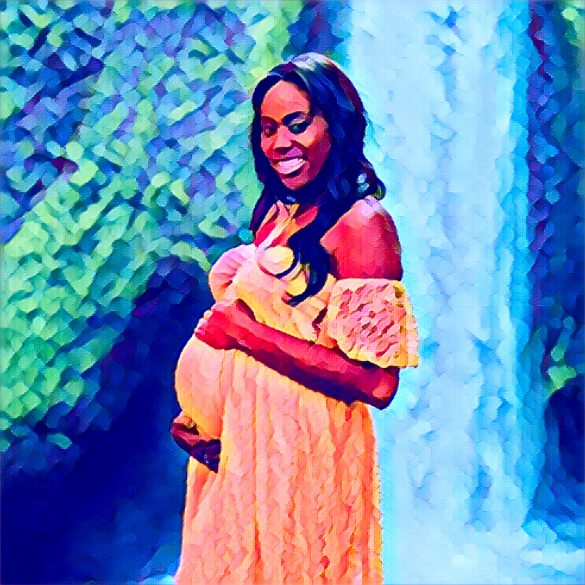In 2022, Panashe Muteedzi decided to have a pregnancy photo shoot. Inspired by images of pregnant celebrities and strangers on social media, she wanted to document her pregnancy journey for her unborn child.
“For my first child, I did not have a pregnancy shoot because of the lockdowns. But now I could,” Muteedzi says. She aims to show her child the stages of pregnancy through pictures. While many shoots on social media feature semi-nude poses, Muteedzi chose a covered-up shoot due to her faith.
“I was born in a Christian family. My father is a pastor. I have nothing against those who do naked pregnancy shoots; it’s their choice,” she says.
Zimbabwe has embraced the global trend of baby bump photo shoots. These images range from fully clothed to fully nude, celebrating motherhood and immortalizing the pregnancy journey. However, the rising popularity of these shoots challenges cultural norms that consider pregnancy a private affair.
Many churchgoers, older people, and traditionalists condemn pregnancy photo shoots. They believe flaunting pregnancy invites misfortune, allowing enemies to tamper with it. Traditionally, pregnancy in African culture is deemed sacred and should remain private.
Historically, a woman’s pregnancy was only publicly known after the birth announcement. However, the digital era has changed that. Photographer Calvin Tome notes that people are copying global trends, often set by celebrities.
In late 2023, a trending maternity shoot by socialite and fitness trainer Michelina Chindiya drew mixed reactions. Some admired the beauty of the images, while others criticized her for going against traditional norms.
“There is a Shona saying, ‘Mozotaura rwendo madzoka,’ meaning you only announce a journey upon return. It’s perfect for this issue,” says George Kandiero, president of the Zimbabwe National Traditional Healers Association. “Announcing will attract mishaps.”
In 1991, celebrity photographer Annie Leibovitz shot a pregnant and nude Demi Moore for a magazine cover. Today, pregnancy shoots are a global sensation, fueled by stars like Beyoncé, Serena Williams, and Rihanna.
Morally and culturally, pregnancy is sacred and should be concealed, says David Mutambirwa, a traditional leader. “This is why maternity wear is loose, meant to cover up comfortably.”
Advertising a pregnancy can give people room to harm you, Mutambirwa says. “By exposing the pregnancy, you show that person your state and give them room to tamper with it.”
Muteedzi says people close to her only realized she was pregnant when she was six months along. She deliberately had her pregnancy shoot at eight months and shared the photos with a few people. “I only posted for the public after the child was born,” she says.
Naomi Takawira, however, released her photos before giving birth, despite her mother’s concerns. She had her photo shoot at 34 weeks pregnant. “My mother was against it; she had reservations because of some myths around pregnancies,” she says. Her child is now over one year old.
“When I look at him and the photos, I see a miracle and am happy that I have this healthy miracle,” Takawira says.
Tome, the photographer, says he has seen a rise in pregnancy photo shoots since 2019. He has done over 100 shoots, including a few nude sessions. However, he has stopped fully nude sessions due to discomfort with deviating from cultural norms.
“People are copying trends and we get crazy shoot requests daily,” Tome says. He adds that social media has led to people wanting to document almost every stage of their lives. Some clients even request monthly photo shoots during pregnancy.
Tome recalls a request for a completely nude shoot at nine months pregnant and another with the baby naked after birth, inspired by an internet shoot. Although he still gets requests for nude shoots, he sets limits. “The extremes I go to are covering your breasts and privates … or the belly not covered.”
Social media has good and bad impacts, Tome says. While it connects people, it can also lead to adopting trends that clash with local culture. “We are neglecting our own culture, adopting Western culture in the process.”
Pregnant women are traditionally considered sacred, says Kandiero, the healer. “There are rituals among the Shona that are performed to protect the baby.” He believes a woman’s body should not be exposed, especially on social media.
Erina Masunda, 89, says that in her time, it was unheard of to be public about pregnancy. “We wore loose clothing and no one knew who was pregnant. We were taught not even to tell anyone.”
Muteedzi treasures her pregnancy photos. “The photos symbolize a whole woman, motherhood, and the gift of life,” she says. “One day my child will see how she came to be,” she adds, as she bounces her cooing baby.
Source: Newsday


